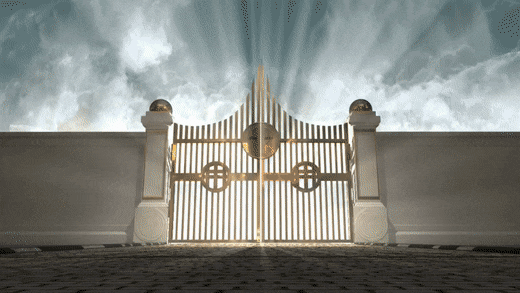Friday, August 7, 2020
How Many States Will Trump Win?
How many States will President Trump win for victory in 2020? pic.twitter.com/2ogpkqX1jJ— William-of-Ockham (@Will_of_Ockham) August 7, 2020
Thursday, August 6, 2020
Wednesday, August 5, 2020
Boilerdoc Has Led A Good Life......
One Day In The Future He Approaches The Gates of Heaven...
They swing open and allow him to enter...

This is what awaits........
Tuesday, August 4, 2020
A very good WW2 story

Pz IV Ausf.G, Tunisia 1943. Bundesarchive.
I was a movie star
Around 2000, I met Sammy Weber (not his real name) at the county fair- he was a brother-in-law of one of our staff (who has since passed away). We were all watching the much anticipated, but utterly disappointing demolition derby- which lasted about 4 minutes. After chatting about the tactics used by the drivers, he mentioned that he was a WWII vet. I asked what he had done- he said "I was a movie star."
Naturally, I pursued this conversation wondering where the hell it's going. It was one of the more unique stories I have ever heard about the War.
First of all, this guy was just about as "country" as one can get- picture Jerry Reed from Smokey and the Bandit and you're 90% of the way there. (Also keep in mind that he was from a small, rural, Kentucky town, grew up on a farm in the 30's with no running water or electricity, and food was scarce at times. The conditions and circumstances that upset many people today, don't even rate mention for him.)
Sammy had enlisted in the Army after Pearl Harbor, and was assigned to the combat engineers, he suspects due to his having listed his occupation as "carpenter". He arrived in Tunisia in mid-November 1942 for what he suspects was one of the shortest combat tours of the War.
When he reached his unit, clashes with the Germans were expected but none had yet occurred. He said that within minutes of arrival, he and another private were detailed to guard a road junction. It was already dark, and they were given zero instructions on what to do in case anything happened- they weren't even oriented as to which way the enemy lines and theirs should be. Just "sit here until relieved". All he had was his rifle, a few clips, and a sack lunch he'd been handed as they left camp.
Within an hour of being dumped on the roadside, his "battle buddy" (name unknown) told him that he had to poop and disappeared into the night. Sammy had just unwrapped his mystery lunch and was fumbling with his sandwich trying to figure out exactly what substance was on it when a tank rolled up. He still could not understand how a tank "snuck up" on him, but it did. One moment it's just him and his lunch, and then the next there's a "big ass tank" idling in front of him.
As he's gaping at the machine, the commander leans over the edge of the turret and said "hop on". He climbed aboard, told the tanker that he had a buddy in the bushes and was told "not to worry, we'll come back for him."
The commander then told him where to sit, warned him to be careful of the exhaust and to hang on. Then the machine turned about in the intersection and headed off- he remembered wondering, despite the moonlit night, with the silhouettes of the ridges being easily distinguished, how the hell the driver could see well enough to stay on the road with no headlights- "the guy probably lived on carrots".
They arrived at a camp, parked the tank and shut down. A small crowd of soldiers gathered as he stood on the engine deck waiting for directions on what to do.
Finally someone asked "are you an American?"
"Well, yeah, what else would I be?"
"Welcome to the Afrika Korps."
The tank commander explained that he was the first GI they had ever met, and to be prepared for lots of attention. Sammy said that from that moment on, he felt more like a movie star on tour being mobbed by fans than a prisoner.
Everyone was polite and friendly, but they wore him out peppering him with questions about any and everything. He spent three days with the unit that had picked him up- he was wined and dined, shown their equipment, compared uniforms, shared family photos, got to "play around" in a tank, and went to church.
The funniest detail is that the Germans didn't take his rifle until later the next day. Then they gave it back to him so he could explain its workings since this was the first M1 Garand they had ever encountered. They fired all his ammunition testing it out.
His impression of the German troops was, "I really liked them- most were Lutherans like me. Too bad their boss started a war."
When he was sent to a POW camp, he was flown across the Mediterranean on an Me 323 Gigant. (He described it and no other aircraft is close.) Once again, he was the first American the crew had met- so, like a kid on an airliner, they offered to let him ride in the cockpit. The crew "talked his ears off" all the way to Italy.
Sammy spent the rest of the War in a POW camp near Munich- the camp was small, and he described it as being an old warehouse- more like a dormitory or barracks than the stereotypical camp with fences. Everyone worked, but they weren't compelled to do so- nobody wanted to sit around bored all day- plus getting out presented "other" opportunities. (He didn't tell me much of anything about his fellow prisoners.)
As a carpenter, his skills were in constant demand and he worked all over the area, mostly on civilian projects, occasionally military ones, plus "personal" jobs for the staff. The Germans he worked for frequently thanked him with gifts of food- which he always shared with his guard.
Most of their guards were old, many lame, who often physically struggled to perform their job. They and the POW's generally got along well and a few became close friends. He laughed that the bit in Hogan's Heroes where the prisoners hold Schultz's rifle all the time was nothing compared to what they (and their guards) did.
The only traumatic events he experienced were the air raids. Although their immediate vicinity wasn't struck, everyone volunteered to help the rescue teams after nearby areas were bombed- he understood it was war, but what he saw in the aftermath of the air strikes really pissed him off.
He said he could have easily have walked away from the camp many times- "but where the hell was I gonna go? Plus- I liked the town, had lots of friends, a job, and the Germans treated me well. I was a poor, 19 year old farm kid on a great adventure. All in all I guess I was pretty content- and lucky. It may sound silly now, but that's how I felt."
In 1945, Sammy came home, got married, had a pack of kids, took over the family farm, and ran a small wood shop in his home town. He passed away about 4 years ago.
He never went back to Europe.
By Rollin Curtis
At The Front
|
BALM*...Protest
Black Angus Lives Matter..
and there's always that one jack-ass Democrat organizer that try's to wreck your truck.
h/t to reader Randy who got this from a friend.
And before anyone says "Irish, those aren't Black Angus" this is the only way I would recognize them or not:
Monday, August 3, 2020
Sunday, August 2, 2020
"You Really Did It. You Maniacs!" *
*Alternate Title... "How Does Irish Waste Two Hours On Sunday Morning?"
Ya, I know, Francis Ford Coppola I'm not.
Subscribe to:
Comments (Atom)
















